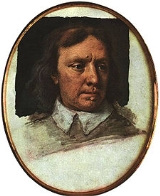
and political
leader who overthrew the English monarchy and temporarily turned England into a republican Commonwealth
, and served as Lord Protector
of England, Scotland, and Ireland.
Cromwell was one of the commanders of the New Model Army
which defeated the royalists
in the English Civil War
. After the execution of King Charles I
in 1649, Cromwell dominated the short-lived Commonwealth of England
, conquered Ireland and Scotland, and ruled as Lord Protector from 1653 until his death in 1658.
Cromwell was born into the ranks of the middle gentry
, and remained relatively obscure for the first 40 years of his life.
1649 Siege of Drogheda ends: Oliver Cromwell's English Parliamentarian troops take the town and execute its garrison.
1649 Sack of Wexford: After a ten-day siege, English New Model Army troops (under Oliver Cromwell) stormed the town of Wexford, killing over 2,000 Irish Confederate troops and 1,500 civilians.
1649 New Ross town, Co. Wexford, Ireland, surrenders to Oliver Cromwell.
1650 Third English Civil War: in the Battle of Dunbar, English Parliamentarian forces lead by Oliver Cromwell defeat an army loyal to King Charles II of England and lead by David Leslie, Lord Newark.
1653 Oliver Cromwell dissolves the Rump Parliament.
1661 Oliver Cromwell, Lord Protector of the Commonwealth of England is ritually executed two years after his death, on the anniversary of the execution of the monarch he himself deposed.
I had rather have a plain, russet-coated Captain, that knows what he fights for, and loves what he knows, than that you call a Gentleman and is nothing else.![]()
A few honest men are better than numbers.![]()
The State, in choosing men to serve it, takes no notice of their opinions. If they be willing faithfully to serve it, that satisfies.![]()
God made them as stubble to our swords.![]()
Truly England and the church of God hath had a great favour from the Lord, in this great victory given us.![]()
We study the glory of God, and the honour and liberty of parliament, for which we unanimously fight, without seeking our own interests... I profess I could never satisfy myself on the justness of this war, but from the authority of the parliament to maintain itself in its rights; and in this cause I hope to prove myself an honest man and single-hearted.![]()
I could not riding out alone about my business, but smile out to God in praises, in assurance of victory because God would, by things that are not, bring to naught things that are.![]()
This is our comfort, God is in heaven, and He doth what pleaseth Him; His, and only His counsel shall stand, whatsoever the designs of men, and the fury of the people be.![]()

